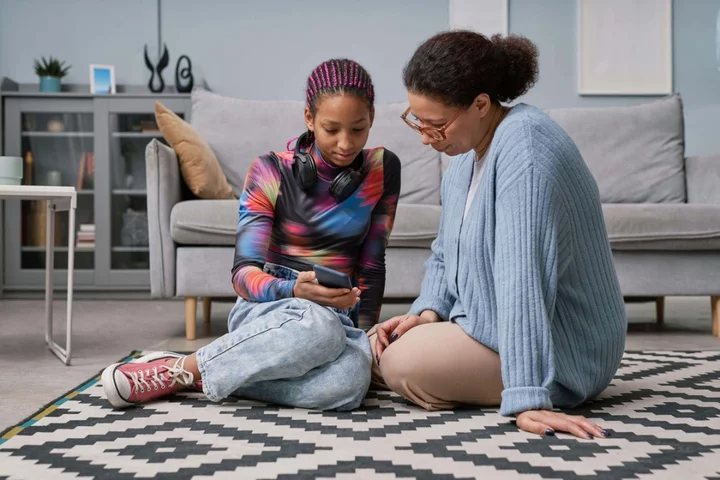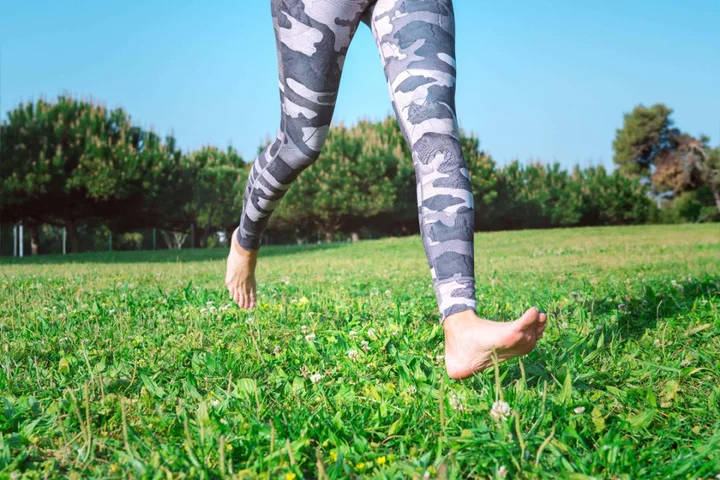
What is money muling and why is it vital parents warn their children about the dangers?
Teenagers often like to have the latest gadgets and trainers, but if a young person suddenly has the ability to splash cash around, with no obvious explanation for their wealth, it could be a warning sign of money muling. Money muling happens when people are persuaded to let cash flow through their bank account in exchange for money or gifts – and young people in particular may be targeted. According to figures released by UK Finance and the fraud prevention body Cifas, young people under the age of 21 account for around one in five cases where money muling activity is suspected. While money muling may be seen as an opportunity to make some easy cash, it’s actually a criminal offence. The cash flowing through bank accounts is often the proceeds from crime. UK Finance and Cifas run a campaign called Don’t Be Fooled, which has developed free PSHE (personal, social, health and economic education) resources for schools, to help young people learn about the dangers and consequences of becoming a money mule. The new schools programme is aimed at youngsters aged 10 to 14. To find out more about the dangers of money muling – and the warning signs for parents to look out for – I asked Paul Maskall, manager of fraud and cybercrime prevention at UK Finance, for his expert insights: How can parents talk to children and teenagers about money mule activity and explain what it is? Paul says: “Even at the best of times, we aren’t always good at valuing and protecting our data, personal information or private details which we store digitally.” He says it’s important for parents to explain what money mules are, “to ensure that the newer generation have a better understanding of how to protect themselves.” He continues: “By doing so, it gives them more of an intuitive defence and understanding of the risk of people wanting to exploit them and gain access to their account, for the purposes of laundering money.” How can young people themselves avoid getting involved in money muling? Maskall stresses the importance of keeping accounts and personal information private. He says: “Criminals seek to manipulate you with a promise of gifts, rewards or a percentage of the funds sent through your account.” People should avoid opening a bank account in their name for someone else, allowing their bank account to be used to send and receive funds for other people, or sharing PINs and passcodes, he says. While criminals will often seek out younger people to become money mules, it’s also important to remember that anyone can be targeted, he adds. What are the warning signs that your child could be involved? “Tell-tale signs that your child might be involved in money muling could be them suddenly having extra cash, buying expensive new clothes or top-of-the-range mobile phones and gadgets with very little explanation as to how they got the money,” Maskall explains. “They may also become more secretive, withdrawn or appear stressed sometimes, becoming more fixated on communication and phone usage.” What are the consequences of money mule activity? Some people may see requests to pass money through their account as harmless – but they could be making a big mistake. “Criminals need money mules to launder the profits of their crimes and frequently target young people, who are often unaware of the consequences of them agreeing to do so,” says Maskall. “Allowing a bank account to be used in this way is a crime and can result in a criminal record and the account being closed. “You could go to prison for up to 14 years and it can also lead to the individual finding it difficult to obtain mobile phone contracts or access financial products and credit, including student loans.” What should parents do if they think their child or someone else they know might be involved in money muling? “It’s important for parents and guardians to remind their children of the potential approaches that they may receive from criminals,” says Maskall. He says if any parents or guardians are worried that someone they are close to might be caught up in money muling, they can contact Crimestoppers anonymously on 0800 555 111. Where can parents go to get support or seek further information and how can communities stay safe? Maskall says: “We encourage everyone to visit the Don’t Be Fooled website for more information on the risk of money muling and how to stop the signs. www.moneymules.co.uk. “It is important to remember that anyone can be at risk and speaking openly and educating one another about the harm and risks involved will benefit others.” Read More From tofu chicken wings to chickpea bacon – how and why you should be making plant-based meat at home Holly Willoughby channels Gwyneth Paltrow with ‘orgasm anxiety’ blog post Do it for the Gram: Speedy but spectacular goat’s cheese linguine Charity boss speaks out over ‘traumatic’ encounter with royal aide Ukraine war’s heaviest fight rages in east - follow live
1970-01-01 08:00

Tempted to try barefoot running? Here’s what you need to know
Barefoot running seems to be rising in popularity, with fans hailing its many benefits – and some even tackling entire marathons without shoes. The thought of bare soles beating the pavement may leave many people wincing, and there are certainly things to consider before giving it a go. But the idea of exploring the most natural way to move – with our primitive bare feet on the ground – could be tempting too. So, what is the deal with barefoot running, and is it worth it? Are there any benefits to barefoot running? “Barefoot running really helps us reconnect with nature,” says Sammy Margo, a physiotherapist working with muscle and joint care specialists Deep Freeze and Deep Heat. For many, this is a big part of the appeal – and some fans of barefoot running say they’ve experienced benefits to their running form too. It’s important to remember our bodies may all respond differently to pressure and force, however, so how we react to barefoot running may vary. “The body, muscles, and joints will take on the ground pressure differently,” says podiatrist Dina Gohil, brand ambassador for CCS Foot Care. “Some people may experience improvement in pain in certain areas, and vice versa. The body works together and force is distributed to the best of your body’s ability to enable the movement you’re trying to achieve.” If you can physically feel your feet hitting the ground however, in theory, your body may become more aware of those forces and movement patterns. “Going shoe-free can help with your awareness of the position and movement of your body – proprioception. Exercising barefoot can also help restore natural running patterns and strides,” Gohil explains. For example, she adds: “Being barefoot can actually allow you to be more conscious of how the heel strikes on the ground, and at what pace and strength. So doing activities barefoot can help strengthen the foot and ankle, improve muscle strength, increase flexibility, and allow for proper movement.” Will you notice other changes? According to barefoot runners, the soles of your feet will also become a lot more resilient over time. “The best way to toughen feet is to try and walk on as many different surfaces as possible. Some people have also used newspapers on the ground to walk on to help with this process,” says Gohil. The muscles in your legs will develop differently too. Margo says: “Running barefoot also activates smaller muscles in our legs and feet, helping to improve strength and overall mobility.” Are there any risks or cons to think about? While many runners experience a range of benefits from going barefoot, there are certainly potential risks to consider. First and foremost, there’s the risk of wounding yourself if you stamp on something sharp – so always be sensible when choosing where to run barefoot. “Until your feet become acclimatised, you may find you are more prone to blisters until firmer skin or calluses have formed,” says Gohil. “There is also the increased risk of developing plantar fasciitis on the sole and heel of the foot. Other problems might include blisters, callus, cuts, infection, Achilles tendonitis, tight lower leg muscles, or stress fractures.” Margo adds: “As our muscles are working harder, [they] may become shorter and tighter, and you may feel some pain initially when you start barefoot running.” Having the support and comfort of a well-fitting running shoe can also be vital for many runners, particularly if you have a history of injuries or joint problems – so it’s advisable to speak with a healthcare professional before you attempt barefoot running. Read More Charity boss speaks out over ‘traumatic’ encounter with royal aide Ukraine war’s heaviest fight rages in east - follow live How can you get rid of acne scars? From serums to laser treatments, experts talk through the options 5 viral TikTok fake tanning tips for the perfect summer glow Not got the A-level grades you needed? Here’s how to get started with the clearing process
1970-01-01 08:00

US CDC tracks new lineage of virus that causes COVID
(Reuters) -U.S. Centers for Disease Control and Prevention said on Thursday that it was tracking a new lineage of the
1970-01-01 08:00

7 Morning Habits That Can Affect Your Entire Day
Set the right tone for the rest of the day by following these expert-approved tips.
1970-01-01 08:00

What You Should Know About Necrotizing Fasciitis, the Flesh-Eating Bacterial Infection
Here's how to stay safe when you take a dip at beaches, lakes, or rivers.
1970-01-01 08:00

Jamie Foxx says he's finally feeling more like himself following hospitalization
Jamie Foxx is sharing an update on his health.
1970-01-01 08:00

What can you actually do to help prevent cancer, as 12% believe coffee is carcinogenic?
A new poll has found that 12% of people still believe that drinking coffee is carcinogenic. The new poll – conducted by the World Cancer Research Fund (WCRF), which surveyed 2,092 adults via YouGov – looked into the different ways people live, and whether it impacts their risk of cancer. The research found that 86% of people believed smoking increased the risk of cancer, while 60% said that being overweight could do the same. 47% thought being physically inactive can be detrimental, and 59% believed a poor diet can up the odds. Almost 59% said alcohol can increase a person’s risk and 55% said processed meat could be a risk factor. WCRF launched its poll to highlight its free eight-week interactive programme Activ8, to provide people with tips on making healthier food and drink choices, and finding different ways to be more active. Cancer Research UK wrote on their website that “not all cancers can be prevented, but there are things you can do to reduce your risk”. A person’s risk of cancer depends on many different things, for example, someone’s genes or age. But according to the charity, four in 10 UK cancer cases could be prevented. “The world around us doesn’t always make it easy to be healthy – but small changes to your daily routine can add up.“ The WCRF agreed and has said that around 40% of cancer cases could be prevented through factors including eating a healthy diet, keeping physically active, maintaining a healthy weight, not smoking and being safe in the sun. Dr Helen Croker, assistant director of research and policy at the WCRF, said: “These poll results show that many people aren’t aware of some of the steps they can take to help protect themselves from cancer. “For example, it’s interesting to see that 12% of Brits believe drinking coffee increases cancer risk, when in fact we have strong evidence that it reduces the risk of liver and womb cancers, and some evidence that drinking coffee could decrease the risk of other cancers, including mouth and skin. “For cancer prevention, there’s no reason for most people not to drink coffee, but for those who do, we recommend not adding sugar or other sweeteners, and drinking it in moderation.” Read More Charity boss speaks out over ‘traumatic’ encounter with royal aide Ukraine war’s heaviest fight rages in east - follow live A-Level results: How to be the emotional support your teen really needs These are the cheapest school uniforms on the high street – according to Which? Half of anxiety and depression cases in new and expectant mums are missed: 7 signs a new mum needs help
1970-01-01 08:00

Scientists find more evidence that a Mediterranean lifestyle helps you live longer
Scientists have found more evidence to suggest that leading a Mediterranean lifestyle could be key to living a longer and healthier life. People who follow a Med lifestyle – including making time for socialising; resting; physical activity and eating a diet rich in fruits, vegetables, and whole grains with low sugar and salt intake – are less likely to die prematurely or die from cancer. And those who get plenty of rest, exercise and make time to socialise with friends are less likely to die as a result of a heart attack or stroke. The new study examined data on 110,799 adults taking part in the UK Biobank study. People aged 45 to 70 from England, Wales and Scotland provided detailed information about their diet and lifestyle habits. The researchers, led by academics from La Universidad Autonoma de Madrid in Spain and Harvard TH Chan School of Public Health in the US, examined information ON Mediterranean food consumption; Mediterranean dietary habits – such as limiting salt and consuming healthy drinks – and lifestyle habits including taking regular naps, exercising, and spending time with friends. Higher total scores in these categories indicated a higher adherence to the Mediterranean lifestyle, the authors said. People involved in the study were tracked for nine years. Some 4,247 people died including 2,401 from cancer and 731 from cardiovascular disease, which includes heart attacks and strokes. Researchers found that people who followed a Mediterranean lifestyle were 29% less likely to die compared to their peers who did not follow this lifestyle. They were also 28% less likely to die from cancer, according to the study, which has been published in the journal Mayo Clinic Proceedings. And people who got plenty of rest and exercise, while also making time to socialise with friends, were also less likely to die from cardiovascular disease. “This study suggests that it’s possible for non-Mediterranean populations to adopt the Mediterranean diet using locally available products and to adopt the overall Mediterranean lifestyle within their own cultural contexts,” said lead author Mercedes Sotos Prieto, from La Universidad Autonoma de Madrid and Harvard Chan School. “We’re seeing the transferability of the lifestyle and its positive effects on health.” Read More Meghan’s got one. Gwynnie, too. But should YOU get a stress-busting wrist patch? How parents can support their children on GCSE and A-level results day A-Level results: How to be the emotional support your teen really needs 11 ways to work the terracotta trend A-Level results: How to be the emotional support your teen really needs These are the cheapest school uniforms on the high street – according to Which?
1970-01-01 08:00

A-Level results: How to be the emotional support your teen really needs
A-Level results day can be joyous for some – a time to celebrate their hard work and look forward to the next chapter of their life. For those who don’t get the grades they were expecting or hoping for, however opening the fateful envelope can spark a range of unpleasant emotions – shock, sadness, regret, and even shame. “Receiving your A-Level results, or any result at all, can be a tough moment in one’s journey, with the outcome possibly impacting one’s plans for the future,” says Dr Jeri Tikare, clinical psychologist at Kooth Digital Health. “Bearing this in mind, it’s easy to see how one can be left with tricky feelings if the results do not meet one’s expectations.” If your teen is unhappy with their results, they’re going to need your support in dealing with the disappointment and navigating their next steps. Psychology and education experts advise on how you can be there for your child on results day and beyond… Be empathetic On results day, it can be helpful to deal with the emotional fallout first, before discussing next steps, such as university or career options. “Make them aware that it is natural and possible to have a mixture of emotions – some of which could include sadness centred around the loss of their dreams of success, anxiety about what the future holds, anger at the self (‘I should have worked harder’), anger at others (‘They did not offer me enough help’), and other emotions,” says Tikare. Instead of brushing their reactions under the rug, try openly discussing and normalising whatever feelings arise. “We know that repressing our emotions can lead to heightened stress and anxiety,” says Tikare. “Recognising and acknowledging the emotions that the student is experiencing can serve as an initial step towards effectively addressing them.” Try to avoid cliches, says Catrin Owen, careers adviser for Working Wales: “Telling someone who’s worked incredibly hard for years towards getting these grades that ‘everything happens for a reason!’ can be like rubbing salt in a wound, and could cause them to become more upset with how their results have turned out.” Don’t make them feel worse On the other hand, recriminations aren’t likely to help. “Rather than focusing on any negativity about exam performance, chances to have revised harder or emphasising what they’ve missed out on, look at all the options and reassure them making a different plan isn’t the end of the world,” Owen adds. “It’s the start of their future, and there are so many opportunities for them to get excited about – whether that’s finding a different course or uni place, going into a different form of training like an apprenticeship, or deciding to enter the world of work now.” Offer guidance “Try to resist the urge to ‘save’ the young person,” Tikare says. “Let them know how proud you are of them, that it is not the end of the world and that despite the pain, things like this happen.” Instead of jumping in and telling your teen exactly what to do now, help them consider their next steps. “Now the initial emotions have passed, it’s time to make a plan,” says Owen. “Speaking to a professional can really help as they can give an objective and impartial view of the situation, and offer solutions you might not have considered yet. “Whether that’s speaking to your school about querying a grade, getting set up with clearing, or contacting a careers adviser – expert guidance can help take the weight off your shoulders as a parent and can reassure you that your child is getting the best help possible.” Signpost support If your teen is continuing to struggle in the weeks after results day, encourage them to seek further support if they need it. “It can be helpful for the student to reach out to trusted people around them, whether it’s a friend, family member, teacher, or counsellor,” says Tikare. “Having someone to talk to can provide emotional support and a listening ear. Remind them that they do not have to go through this alone.” And finally, Owen adds, “Focus on the positives – planning their future is exciting, even if there are curveballs.”
1970-01-01 08:00

A Mediterranean lifestyle helps you live longer – study
Scientists have found more evidence to suggest that leading a Mediterranean lifestyle could be key to living a longer and healthier life. People who follow a Med lifestyle – including making time for socialising; resting; physical activity and eating a diet rich in fruits, vegetables, and whole grains with low sugar and salt intake – are less likely to die prematurely or die from cancer. And those who get plenty of rest, exercise and make time to socialise with friends are less likely to die as a result of a heart attack or stroke. The new study examined data on 110,799 adults taking part in the UK Biobank study. This study suggests that it’s possible for non-Mediterranean populations to adopt the Mediterranean diet using locally available products and to adopt the overall Mediterranean lifestyle within their own cultural contexts Mercedes Sotos Prieto People aged 45 to 70 from England, Wales and Scotland provided detailed information about their diet and lifestyle habits. The researchers, led by academics from La Universidad Autonoma de Madrid in Spain and Harvard TH Chan School of Public Health in the US, examined information ON Mediterranean food consumption; Mediterranean dietary habits – such as limiting salt and consuming healthy drinks – and lifestyle habits including taking regular naps, exercising, and spending time with friends. Higher total scores in these categories indicated a higher adherence to the Mediterranean lifestyle, the authors said. People involved in the study were tracked for nine years. Some 4,247 people died including 2,401 from cancer and 731 from cardiovascular disease, which includes heart attacks and strokes. Researchers found that people who followed a Mediterranean lifestyle were 29% less likely to die compared to their peers who did not follow this lifestyle. They were also 28% less likely to die from cancer, according to the study, which has been published in the journal Mayo Clinic Proceedings. And people who got plenty of rest and exercise, while also making time to socialise with friends, were also less likely to die from cardiovascular disease. “This study suggests that it’s possible for non-Mediterranean populations to adopt the Mediterranean diet using locally available products and to adopt the overall Mediterranean lifestyle within their own cultural contexts,” said lead author Mercedes Sotos Prieto, from La Universidad Autonoma de Madrid and Harvard Chan School. “We’re seeing the transferability of the lifestyle and its positive effects on health.” Read More Charity boss speaks out over ‘traumatic’ encounter with royal aide Ukraine war’s heaviest fight rages in east - follow live These are the cheapest school uniforms on the high street – according to Which? Half of anxiety and depression cases in new and expectant mums are missed: 7 signs a new mum needs help This Morning’s Dr Zoe Williams: Why gut health could be more important than you think this summer
1970-01-01 08:00

These are the cheapest school uniforms on the high street – according to Which?
Sainsbury’s is the cheapest place to buy school uniforms while Next is the most expensive at more than double the price, according to research. Consumer group Which? analysed the costs of a selection of essential school uniform items for nine-year-olds at eight supermarkets and clothing retailers. The items included two each of pinafore dresses, polo shirts, skirts, sweatshirts, boys’ trousers and girls’ trousers. Household budgets have been battered by an unrelenting cost of living crisis, but our latest research shows some retailers will help your money go further than others Ele Clark, Which? retail editor The group said its research showed that at a time when household budgets are being “battered by an unrelenting cost-of-living crisis”, money will go further at some retailers than others. Which? said Tu Clothing at Sainsbury’s was the cheapest, costing a total of £47. At Next, the same selection cost £102, the group said, although it noted that due to some of the items being sold individually rather than in multipacks, it had to double the price of a single item to allow for comparison. Second-cheapest was Morrisons, costing £48.95, followed by George clothing at Asda, F&F Clothing at Tesco, Matalan, Marks & Spencer and John Lewis’s Anyday range, Which? said. The consumer group said Morrisons and Tesco prices were shared directly with Which? on July 26, while they checked the prices of items from the rest of the retailers on August 9. The group said its analysis focused only on the prices of items, rather than any differences in the quality, comfort or durability. Aldi and Lidl were also cited as selling cheap uniforms, but were not included in the Which? analysis as the group said the supermarkets tend to have “special buy” deals which sell out quickly and are generally not restocked. Ele Clark, Which? retail editor, said: “School uniforms don’t come cheap – especially if you have to buy them for more than one child. Household budgets have been battered by an unrelenting cost-of-living crisis, but our latest research shows some retailers will help your money go further than others. “Parents and guardians can also save money by buying second-hand, opting for multipacks, choosing longer-lasting options such as trousers with a hem that can be let down, and of course, keeping an eye out for special offers.” In June, a charity warned that parents were still having to spend “exorbitant amounts” on school uniform despite changes introduced last year aimed at keeping costs down. The Children’s Society said its research suggested parents and carers of secondary school children were paying on average £422 per year on uniform, and around £287 for primary school children. It said the high costs were partly due to the requirement from some schools for branded items which have to be bought from specialist shops rather than supermarkets or high-street chains. A Department for Education spokesperson said at the time that it expected schools in England to comply with its uniforms guidance – which requires schools to keep branded uniform items to a minimum and allow more high-street options – by September.
1970-01-01 08:00

German cabinet OKs landmark bill over legal cannabis use
By Sarah Marsh and Andreas Rinke BERLIN (Reuters) -Germany's cabinet passed a contentious bill on Wednesday to legalize recreational marijuana
1970-01-01 08:00
